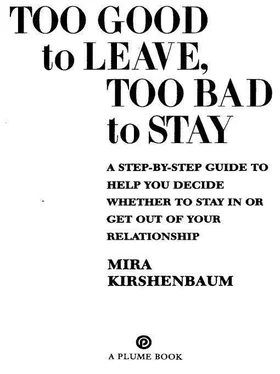Kirshenbaum, Mira - Too Good to Leave, Too Bad to Stay
Здесь есть возможность читать онлайн «Kirshenbaum, Mira - Too Good to Leave, Too Bad to Stay» весь текст электронной книги совершенно бесплатно (целиком полную версию без сокращений). В некоторых случаях можно слушать аудио, скачать через торрент в формате fb2 и присутствует краткое содержание. Жанр: Психология. Описание произведения, (предисловие) а так же отзывы посетителей доступны на портале библиотеки ЛибКат.
- Название:Too Good to Leave, Too Bad to Stay
- Автор:
- Жанр:
- Год:неизвестен
- ISBN:нет данных
- Рейтинг книги:3 / 5. Голосов: 1
-
Избранное:Добавить в избранное
- Отзывы:
-
Ваша оценка:
- 60
- 1
- 2
- 3
- 4
- 5
Too Good to Leave, Too Bad to Stay: краткое содержание, описание и аннотация
Предлагаем к чтению аннотацию, описание, краткое содержание или предисловие (зависит от того, что написал сам автор книги «Too Good to Leave, Too Bad to Stay»). Если вы не нашли необходимую информацию о книге — напишите в комментариях, мы постараемся отыскать её.
Too Good to Leave, Too Bad to Stay — читать онлайн бесплатно полную книгу (весь текст) целиком
Ниже представлен текст книги, разбитый по страницам. Система сохранения места последней прочитанной страницы, позволяет с удобством читать онлайн бесплатно книгу «Too Good to Leave, Too Bad to Stay», без необходимости каждый раз заново искать на чём Вы остановились. Поставьте закладку, и сможете в любой момент перейти на страницу, на которой закончили чтение.
Интервал:
Закладка:
Here are the crucial ingredients in this guideline:
1. “Starting to convince you.” Your partner is saying things that you’re actually coming to believe are true. Notice that if the things your partner says don’t start to convince you, then this guideline doesn’t apply. My husband tells me that he doesn’t think I’m a very good driver, but nothing he’s ever said or done has convinced me that I’m not a good driver.
2. “Through disrespectful words and actions.” Your partner convinces you not only by saying things that put you down but by doing things. For example, he may not say in front of the kids that you don’t know what you’re talking about, but whenever you finish telling them to do something he goes behind your back and tells the kids they don’t have to pay attention to you.
3. “You’re a nut or a jerk or a loser or an idiot.” Who cares if their partner convinces them that they don’t know how to tune up a car’s engine or judge modem art? The disrespect I’m talking about here gets at the heart of what we need to function as whole people. You can’t function if you think you’re crazy or if you think that no one likes you or if you think that you never do anything right or if you think that you’re basically stupid. Disrespect that starts to convince you of this is disrespect that undermines what you need to function.
4. “Parts of yourself that are important to you.” You not only can’t function if you believe there’s something wrong with you as a whole. You also can’t function if the very things that are most important to you to do in life are made impossible by the impact of your partner’s disrespect. If being a parent, for example, or trying to get ahead in business is not only something you do but something that’s vitally important to your sense of yourself, then if you’re convinced you can’t do that your partner’s disrespect is crippling.
These are the ingredients to focus on if you’re trying to decide whether guideline #24 applies to you.
You Can’t Drink the Water
Let me share with you the image I’ve used to help me draw the line between the kind of disrespect that goes on all the time and the kind of disrespect that means you have to head for the hills. Later you’ll see how this image applies not only to this guideline but to the other three guidelines in this chapter. It’s the image of pollution.
Imagine a reservoir from which the people in your town get their drinking water. Most tap water, even though it meets health code standards, isn’t perfectly pure. But it’s pure enough for most of us. The place where you draw the line is the point at which that water becomes toxic. You can quibble over parts per million of this or that chemical or microbe, but when people start becoming sick you shut the thing down. We can live with drinking water that’s a tiny bit murkier or smellier than we’d like, but damage must not occur.
And it’s the same with disrespect in our relationships. When “putdown pollution” starts to cause real harm because you start believing the bad things your partner’s saying about you and when your believing these things changes how you act and live, then you’re being maimed or destroyed psychologically just the way any poisoning victim is damaged by a particular toxin.
PERSPECTIVES: LOVE AND RESPECT
To diagnose what to do with an iffy relationship, you’ve got to draw the line between disrespect you can live with and disrespect you cannot live with. Since I’m trying to help you with this I’ve got to be concerned with two things: I’ve got to prevent people from leaving perfectly decent relationships and I’ve got to prevent people from staying in harmful relationships.
It’s important to understand why disrespect is as universal in relationships as low-level pollution is in every part of our daily lives. If you understand where disrespect comes from, then you can see it better and deal with it better in relationships that are otherwise too good to leave without having unrealistically high standards and giving up on those relationships.
Not for Amateurs
One of the most famous things anyone’s ever said about love comes, appropriately enough, from Erich Fromm’s The Art of Loving. That’s where he said, essentially, that you have to love yourself before you can love someone else. Few ideas are more widely held than this. I remember my parents telling me this as I was growing up. I remember how my friends and I used to say this to each other as young adults. And I remember how surprised I was to hear my daughters recounting this bit of wisdom to me as they were entering adulthood.
But why was Erich Fromm making a point of this? Why is it important? And why do we believe this?
What I now know, having studied the real workings of love in relationships for a very long time, is that you have to love yourself before you love someone else because once you’re in a relationship things will happen that will make it hard for you to sustain your self-love. Fromm understood that, as I said earlier, relationships contain the soil out of which disrespect grows.
After the Campaign
So here’s what we’re all up against. In the beginning you meet someone and fall in love. As you fly through the air, falling head over heels, you’re thinking to yourself, she’s wonderful, she’s special, she’s great. The rocket of love is hard to launch without this fuel of mutual adoration.
But what goes up must come down. Just as there’s always a difference between campaign promises and the real floundering the candidate actually does once he’s in office, once you’ve elected yourselves an official couple you arrive at that promised land of intimacy you’ve been seeking so avidly. But time turns intimacy into familiarity, and we all know what familiarity breeds.
Disrespect doesn’t happen everywhere, because there are always ways in which people surpass our expectations, usually in areas where we didn’t have such high expectations to begin with. But in the back alleys of intimacy where we see each other physically and emotionally naked, flaws and failings emerge from every crack and crevice. To understand how disrespect grows, let’s look at where respect comes from:
• You get respect from being who you’re supposed to be in your relationship, such as lover, income earner, parent, house maintainer.
• You get respect from how well you deliver on your promises, such as your promise to be a successful business person or artist or your promise to keep your youthful figure or always be supportive.
• You get respect for delivering surprises, for somewhere along the line accomplishing something or being something beyond your partner’s expectations.
• You get respect for having strengths and abilities in areas where your partner happens to be weak, such as being a whiz at family finances where your partner has trouble balancing a checkbook or being really good with the kids where your partner gets overwhelmed.
Just think of how easy it is for respect to turn into disrespect in each of these areas:
You try to be who you’re supposed to be, but differences and disappointments creep in about what it actually means for you to be a good lover or income earner and about how well you’ve done in each of these areas.
You try to deliver on your promises, but half your promises were unrealistic and the other half, frankly, you don’t even remember making.
You’d love to surprise your partner with some accomplishment, but just when he starts getting jaded your ability to produce surprises diminishes.
And you count on being able to do a good job in those areas where your partner has weaknesses, but all too often your partner one day decides to learn what you’ve been doing and discovers you’re not so hot after all.
Читать дальшеИнтервал:
Закладка:
Похожие книги на «Too Good to Leave, Too Bad to Stay»
Представляем Вашему вниманию похожие книги на «Too Good to Leave, Too Bad to Stay» списком для выбора. Мы отобрали схожую по названию и смыслу литературу в надежде предоставить читателям больше вариантов отыскать новые, интересные, ещё непрочитанные произведения.
Обсуждение, отзывы о книге «Too Good to Leave, Too Bad to Stay» и просто собственные мнения читателей. Оставьте ваши комментарии, напишите, что Вы думаете о произведении, его смысле или главных героях. Укажите что конкретно понравилось, а что нет, и почему Вы так считаете.












